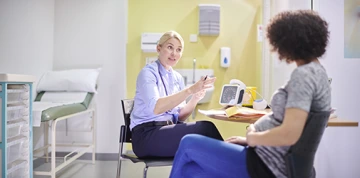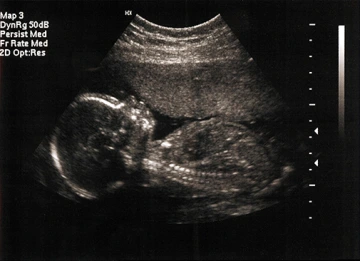Noninvasive Prenatal Testing: A New Genetic Screening Tool for Use by Pregnant Women
Noninvasive prenatal testing (NIPT), one of the newest additions in genomic testing, is a simple blood test that can tell a lot about a baby’s likelihood of having certain genetic conditions.

During the past six years, advances in genetic technology completely have changed the way women and their health-care providers approach genetic testing during pregnancy.
Noninvasive prenatal testing (NIPT), one of the newest additions in genomic testing, is a simple blood test that can tell a lot about a baby’s likelihood of having certain genetic conditions.
During pregnancy, the placenta sheds cells into the mother’s bloodstream. Eventually, these cells die, and the DNA contained in those placental cells – DNA very similar to that from the fetus – is released into the mother’s blood and mixes with maternal DNA. NIPT, also known as noninvasive prenatal screening (NIPS) or prenatal cell-free DNA screening, is a new prenatal screening technique that uses high-throughput DNA sequencing to analyze this small fraction of the baby’s DNA present in the mother’s blood sample.

Noninvasive prenatal testing is a screening test, not a diagnostic. It can be used to flag women who may have a higher risk of having a baby with one or more of the chromosomal abnormalities for which it tests.
Since 2012, NIPT has been used to screen for certain chromosomal conditions in a developing baby. These conditions, called aneuploidies, occur when a baby has an incorrect number of chromosomes. NIPT typically screens for Down syndrome, trisomies 18 and 13, and also can flag cases in which the baby may have an incorrect number of sex chromosomes. In addition, NIPT can reveal the sex of the baby.
While there are numerous benefits to this type of testing, including lowering the number of invasive tests performed on low-risk pregnancies, the test does have some limitations. “While NIPT has really expanded the use of genetic testing in prenatal care, it’s important to remember that it can’t tell us everything,” says Ms. Benson. “No test can guarantee a perfectly healthy baby.”

Since 2012, noninvasive prenatal testing has been used to screen for certain chromosomal conditions in a developing baby.
Researchers continue to expand this technology to tackle other health-care problems. For example, ongoing research is identifying ways that high-throughput DNA sequencing can be applied to liquid biopsies, in which DNA from a simple blood or urine sample is analyzed to detect, monitor and identify cancers or help improve the precision of targeted therapies. Just as NIPT has revolutionized prenatal genetic testing, and may become the standard of care, researchers in this field are confident that continued advances in DNA sequence analysis will continue to transform other areas of medicine.
About the Author
Valerie Schaibley, PhD is the Administrator for the Center for Applied Genetics and Genomic Medicine at the University of Arizona Health Sciences, where she works to advance precision health in the state of Arizona. She received her PhD in Human Genetics from the University of Michigan and worked for several years in industry, developing genetic tests for precision medicine applications.
About the Author
Kenneth S. Ramos, MD, PhD, PharmB, served as associate vice president for precision health sciences at the University of Arizona Health Sciences, director of the Center for Applied Genetics and Genomic Medicine and the MD-PhD Program, and professor of medicine. In 2019, Dr. Ramos accepted a position as executive director of the Institute of Biosciences and Technology in Houston and assistant vice chancellor for Health Services at The Texas A&M University System.
Dr. Ramos is a physician-scientist with interests in molecular and precision medicine, particularly as it relates to vascular pathology, oncology and chronic diseases of the lung. His translational research program integrates diverse approaches ranging from molecular genetics to population-based studies to elucidate genetic and genomic mechanisms of pathogenesis, and to develop novel approaches and therapies to minimize chronic diseases caused by environmental injury. Ongoing translational studies in his laboratory focus on the study of repetitive genetic elements in the mammalian genome and their role in genome plasticity, toxicity and disease, while clinical studies focus on the development and characterization of diagnostic and prognostic biomarkers of cancer and chronic pulmonary disease to advance the goals of personalized genomic medicine. He has directed two NIH P30 Centers of Excellence working at the interface between genomics and environmental health and medicine and have provided administrative and scientific leadership for two academic centers focusing on genetics and genomic medicine. He has influenced the career of many scientists through my involvement in several NIH-funded training and career development programs where he has mentored over 100 doctoral, medical, veterinary, undergraduate and high school students, many of whom have gone on to successful careers in academia, medicine, government and industry. He is deeply committed to initiatives that advance precision medicine and its applications to reduce disease burden and health disparities, improve quality of healthcare and reduce costs.

